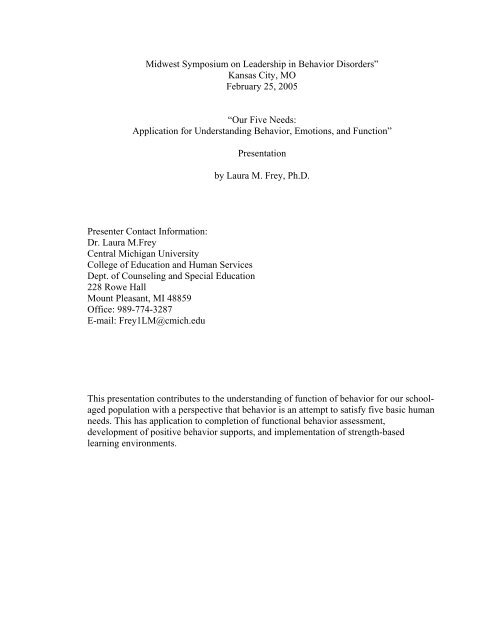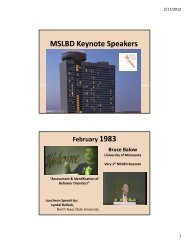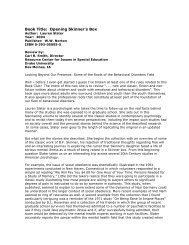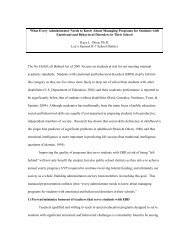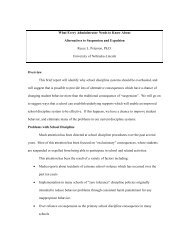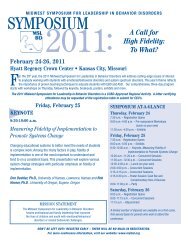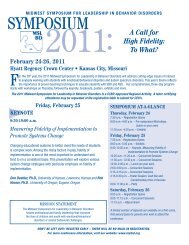Handout Frey in Adobe PDF document, 30Kb - MSLBD
Handout Frey in Adobe PDF document, 30Kb - MSLBD
Handout Frey in Adobe PDF document, 30Kb - MSLBD
You also want an ePaper? Increase the reach of your titles
YUMPU automatically turns print PDFs into web optimized ePapers that Google loves.
Midwest Symposium on Leadership <strong>in</strong> Behavior Disorders”<br />
Kansas City, MO<br />
February 25, 2005<br />
“Our Five Needs:<br />
Application for Understand<strong>in</strong>g Behavior, Emotions, and Function”<br />
Presentation<br />
by Laura M. <strong>Frey</strong>, Ph.D.<br />
Presenter Contact Information:<br />
Dr. Laura M.<strong>Frey</strong><br />
Central Michigan University<br />
College of Education and Human Services<br />
Dept. of Counsel<strong>in</strong>g and Special Education<br />
228 Rowe Hall<br />
Mount Pleasant, MI 48859<br />
Office: 989-774-3287<br />
E-mail: <strong>Frey</strong>1LM@cmich.edu<br />
This presentation contributes to the understand<strong>in</strong>g of function of behavior for our schoolaged<br />
population with a perspective that behavior is an attempt to satisfy five basic human<br />
needs. This has application to completion of functional behavior assessment,<br />
development of positive behavior supports, and implementation of strength-based<br />
learn<strong>in</strong>g environments.
Through behavior <strong>in</strong>dividuals seek to satisfy their basic human needs. In school sett<strong>in</strong>gs, student<br />
behavior and the quest for need satisfaction can be positive and productive when it not only<br />
meets students’ needs but also aligns with the expectation of others <strong>in</strong> the school and classroom<br />
environment.<br />
Student behavior can be viewed as negative, counterproductive, and/or <strong>in</strong>appropriate if it does<br />
not meet the expectation of others <strong>in</strong> the immediate environment. This can lead to the label<strong>in</strong>g of<br />
students as discipl<strong>in</strong>e problems with teachers try<strong>in</strong>g to figure out how to have control of their<br />
classrooms. The focus on follow<strong>in</strong>g rules can lead teachers <strong>in</strong>to a perpetual state of “try<strong>in</strong>g to<br />
get students to do” result<strong>in</strong>g <strong>in</strong> ongo<strong>in</strong>g efforts to externally control students.<br />
Teach<strong>in</strong>g proactive social behavior can beg<strong>in</strong> with the understand<strong>in</strong>g that behavior is the result of<br />
attempts to satisfy basic human needs, usually the result of need deficits.<br />
Total Behavior<br />
William Glasser describes the components of behavior as four wheels of a car. The four<br />
behaviors with<strong>in</strong> Total Behavior are: Action, Th<strong>in</strong>k<strong>in</strong>g, Feel<strong>in</strong>g, and Physiology. The car is a<br />
front wheel drive car. The front wheels are Action and Th<strong>in</strong>k<strong>in</strong>g. The back wheels are Feel<strong>in</strong>g<br />
and Physiology. All four behaviors <strong>in</strong>teract together and are impacted/affected by one another.<br />
Whenever one component shifts the total behavior shifts accord<strong>in</strong>gly. Our choice of action and<br />
th<strong>in</strong>k<strong>in</strong>g take us down a certa<strong>in</strong> path <strong>in</strong> life. Our feel<strong>in</strong>gs and health give us an ongo<strong>in</strong>g<br />
assessment of the “road” we are on do<strong>in</strong>g what we are do<strong>in</strong>g and th<strong>in</strong>k<strong>in</strong>g.<br />
Our wheels are cont<strong>in</strong>ually rebalanc<strong>in</strong>g moment by moment as behavioral components shift.<br />
Individuals tend to develop unique repetitive patterns, which become our recognized behavioral<br />
style. Our Total Behavior is an ongo<strong>in</strong>g attempt to satisfy our needs that align also with our<br />
Quality World. So, all this is <strong>in</strong>teraction <strong>in</strong> each <strong>in</strong>dividual.<br />
All we do from birth to death is behave. We are always try<strong>in</strong>g to behave <strong>in</strong> a way that gives us<br />
the most effective control over our lives. This means be<strong>in</strong>g able to act <strong>in</strong> a way that satisfies the<br />
pictures <strong>in</strong> our quality world.<br />
The key is balance. We need to balance not only our needs, but also our behaviors. We are<br />
uniquely <strong>in</strong>dividual <strong>in</strong> our balanc<strong>in</strong>g act. Aga<strong>in</strong>, as with Choice Theory, we can choose to<br />
control our actions. We can choose to stop <strong>in</strong>effective, pa<strong>in</strong>ful behaviors. We can change our<br />
wants or shift our quality world. We can do both. But the only one any <strong>in</strong>dividual can control is<br />
self. Awareness that behavior is a total component of act<strong>in</strong>g, th<strong>in</strong>k<strong>in</strong>g, feel<strong>in</strong>g, and physiology –<br />
all <strong>in</strong> one total package is powerful.<br />
Sources:<br />
Glasser, W. (1998). Choice Theory: A New Psychology of Personal Freedom. New York,<br />
NY:HarperColl<strong>in</strong>s.<br />
Wubbold<strong>in</strong>g, R.W. (2000). Reality Therapy for the 21 st Century. Philadelphia, PA: Taylor and Frances.<br />
Wubbold<strong>in</strong>g R.E. & Brickell, J. (1999). Counsel<strong>in</strong>g with Reality Therapy. Oxon, United K<strong>in</strong>gdom:<br />
Speechmark Publish<strong>in</strong>g, Ltd.
Five Basic Human Needs - Overview for School Sett<strong>in</strong>gs<br />
Human Need Components ____________________________<br />
Survival<br />
Belong<strong>in</strong>g and Love<br />
Power/Self-Worth<br />
Freedom<br />
Fun<br />
Physical needs for food, water, air, safety, shelter, physical health, sexuality<br />
Sense of security <strong>in</strong> ongo<strong>in</strong>g provision of basic physical needs, <strong>in</strong>clud<strong>in</strong>g <strong>in</strong>come<br />
Psychological need for: family relationships, friendships, work<strong>in</strong>g relationships,<br />
Connect<strong>in</strong>g with people through cooperation, car<strong>in</strong>g, shar<strong>in</strong>g, <strong>in</strong>volvement<br />
Psychological need for: empowerment, worth<strong>in</strong>ess, self-efficacy, achievement,<br />
Accomplishment, pride, importance, recognition, self-esteem, to be able/capable<br />
Psychological need for: <strong>in</strong>dependence, autonomy, options, choices, liberty<br />
Ability to create, free express of self, hav<strong>in</strong>g sufficient space, free will<br />
Psychological need for: enjoyment, pleasure, relaxation, laughter, learn<strong>in</strong>g<br />
Engag<strong>in</strong>g <strong>in</strong> a hobby, hav<strong>in</strong>g <strong>in</strong>terest, feel<strong>in</strong>g excited, hav<strong>in</strong>g a sense of humor<br />
Five Basic Human Needs - Application of Unmet Needs to School Sett<strong>in</strong>g<br />
Human Need<br />
Survival<br />
Belong<strong>in</strong>g and Love<br />
Power/Self-Worth<br />
Freedom<br />
Fun<br />
UnMet Needs Awareness for School Personnel______________<br />
Impact of unmet food, cloth<strong>in</strong>g and health needs on ability to learn<br />
Impact of unmet safety needs from home or school environment to learn<strong>in</strong>g<br />
Impact of academic and learn<strong>in</strong>g challenges to survival with peer group<br />
Impact of academic and learn<strong>in</strong>g challenges to survive (rema<strong>in</strong>) <strong>in</strong> school<br />
Impact of lack of peer acceptance (perceived or real) on learn<strong>in</strong>g<br />
Impact of stra<strong>in</strong>ed family relationships and challenged family dynamics on learn<strong>in</strong>g<br />
Impact of not hav<strong>in</strong>g a role of value to peers and/or adults <strong>in</strong> the school sett<strong>in</strong>g<br />
Impact of academic challenges to sense of belong<strong>in</strong>g <strong>in</strong> a learn<strong>in</strong>g environment<br />
Impact of learn<strong>in</strong>g challenges to feel<strong>in</strong>gs of self-worth <strong>in</strong> school sett<strong>in</strong>g<br />
Impact of problem behaviors are not be<strong>in</strong>g respected <strong>in</strong> school sett<strong>in</strong>g<br />
Impact of limited ability to contribute to decision mak<strong>in</strong>g <strong>in</strong> school sett<strong>in</strong>g<br />
Impact of academic deficits to feel<strong>in</strong>gs of accomplishment <strong>in</strong> school sett<strong>in</strong>g<br />
Impact of hav<strong>in</strong>g majority of learn<strong>in</strong>g scheduled by adults <strong>in</strong> school sett<strong>in</strong>g<br />
Impact of little to no free time dur<strong>in</strong>g daily learn<strong>in</strong>g schedule <strong>in</strong> school sett<strong>in</strong>g<br />
Impact of crowded classrooms, shar<strong>in</strong>g lockers, teachers mak<strong>in</strong>g most decisions<br />
Impact of hav<strong>in</strong>g adults judge your thoughts and creativeness by their standards<br />
Impact of do<strong>in</strong>g un<strong>in</strong>terest<strong>in</strong>g and rout<strong>in</strong>e school work on desire to learn<br />
Impact of punitive rules and school environment on sense of enjoyment to learn<br />
Impact of limited peer socialization and leisure dur<strong>in</strong>g school day to learn<strong>in</strong>g fun<br />
Impact of school as unmotivat<strong>in</strong>g and irrelevant on future learn<strong>in</strong>g for employment
Five Basic Human Needs as a Source of Function<br />
Sequence to Behavior Improvement<br />
1. Current Behavior 2. Function 3. Behavior Improvement<br />
Identify and Def<strong>in</strong>e Behavior Develop a Hypothesis Start with Function<br />
Collect Data Identify Cause/Motivation Design Intervention <strong>in</strong>:<br />
Frequency * Survival Needs * curriculum<br />
Duration * Love and Belong<strong>in</strong>g Needs * <strong>in</strong>struction<br />
Intensity * Power/Self-Worth Needs * environment<br />
Location * Freedom Needs * relationships<br />
Antecedents * Fun Needs * health<br />
Consequences<br />
Time<br />
For Positive Behavior Supports<br />
Review Data Needs<br />
<strong>in</strong> one or more Five Basic Needs<br />
Analyze Collected Data<br />
Implement Teach<strong>in</strong>g <strong>in</strong> area of<br />
Unmet Need<br />
Common Student Behavior Challenges and Examples of Unmet Needs<br />
Behavior Challenge<br />
Refusal to Work<br />
Relation to Basic Human Needs to be Met____________<br />
Lack of sleep (survival) due to home challenges and unable work<br />
Best friend is refus<strong>in</strong>g to work; wants to ma<strong>in</strong>ta<strong>in</strong> alliance (belong<strong>in</strong>g)<br />
Academic difficulty (power) and doesn't want to feel like a failure<br />
Wants choice of current academic task versus teacher choice (freedom)<br />
Bored by current academic task and just not <strong>in</strong>terested (fun)<br />
Frequent Out-of-Seat<br />
Fail<strong>in</strong>g <strong>in</strong> class, already will have to repeat (survival) no desire to focus<br />
Wants to talk with friends and feel valued <strong>in</strong> class (belong<strong>in</strong>g)<br />
F<strong>in</strong>ishes work early as it was easy, look<strong>in</strong>g for more challenge (power)<br />
Not defiant, just doesn't like be<strong>in</strong>g restricted <strong>in</strong> desk seat (freedom)<br />
Is a hands-on k<strong>in</strong>esthetic learner <strong>in</strong> order for it enjoy learn<strong>in</strong>g (fun)<br />
Argumentative Communication<br />
Home environment has anger and confrontative behavior (survival)<br />
Perception that peers are not accept<strong>in</strong>g and fear of rejection (belong<strong>in</strong>g)<br />
Seek<strong>in</strong>g to feel capable <strong>in</strong> the eyes of teacher and is challenged (power)<br />
Values freedom of speech and voice for youth development (freedom)<br />
F<strong>in</strong>ds the school rules punitive and un<strong>in</strong>terested <strong>in</strong> school rout<strong>in</strong>es (fun)


